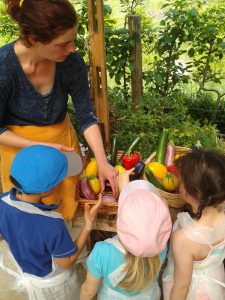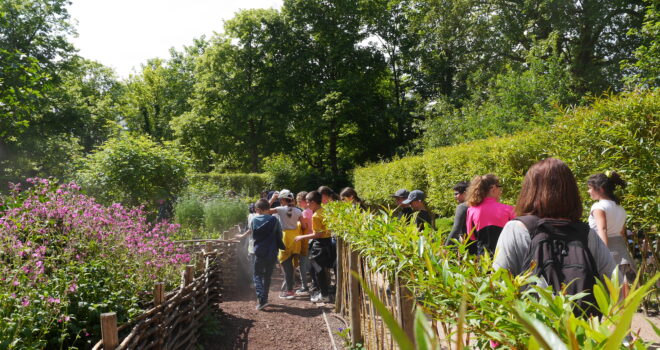The Légumothèque opened on May 28, 2017, expanding the nature discovery trails at Abbaye de Royaumont. It is located in the large greenhouse and has become an educational tool which enables school classes to learn about the vegetables in the garden in a fun way. The tool is extremely well liked by the children, their teachers and the docents who bring it to life. The Légumothèque consists of an exhibit on 32 vegetables, a walk through the vegetable garden and a tasting session.
It has been a year and a half since it opened and nearly 1,055 children (from kindergarten to middle school) and their parents have visited the Légumothèque with a group, on a school trip or extracurricular outing, or during a workshop organized for families. Between May 2017 and July 2018, 875 children participated in the “Légumothèque Tasting Session” as part of a school activity. The main attraction of this workshop is discovering little known vegetables, such as Chinese artichokes, chard and sunchokes.
Attaching the vegetables to their signs in the large greenhouse is the centerpiece of the activity. Children can talk with the docent about the differences between the plant drawings and the plants they saw in the garden depending on the season. The vegetable scavenger hunt enables many children to discover vegetable gardens and learn how edible plants are grown, which is far from obvious for quite a few of them.

The Légumothèque at Royaumont is the perfect place to share values like protecting biodiversity and the environment and promoting sustainable development with a young audience.
A visit to the Légumothèque allows children to:
- Understand how a vegetable garden is managed throughout the year and why,
- Understand the gardener’s role in the garden and, more generally, humans’ role in nature,
- Illustrate the cycle of the seasons,
- Discover the wildlife found in the vegetable garden, especially insects and their roles,
- Understand where most of the vegetables they eat come from and how they are grown,
- Understand the benefits of integrated and organic growing,
- Enjoy a fun tour of a garden and understand how it was designed.
This project was supported by the Louis Bonduelle Foundation during its summer 2015 call for proposals.



 Bean sprouts
Bean sprouts  Chard
Chard  Vegetable garden: growing black radish
Vegetable garden: growing black radish 









